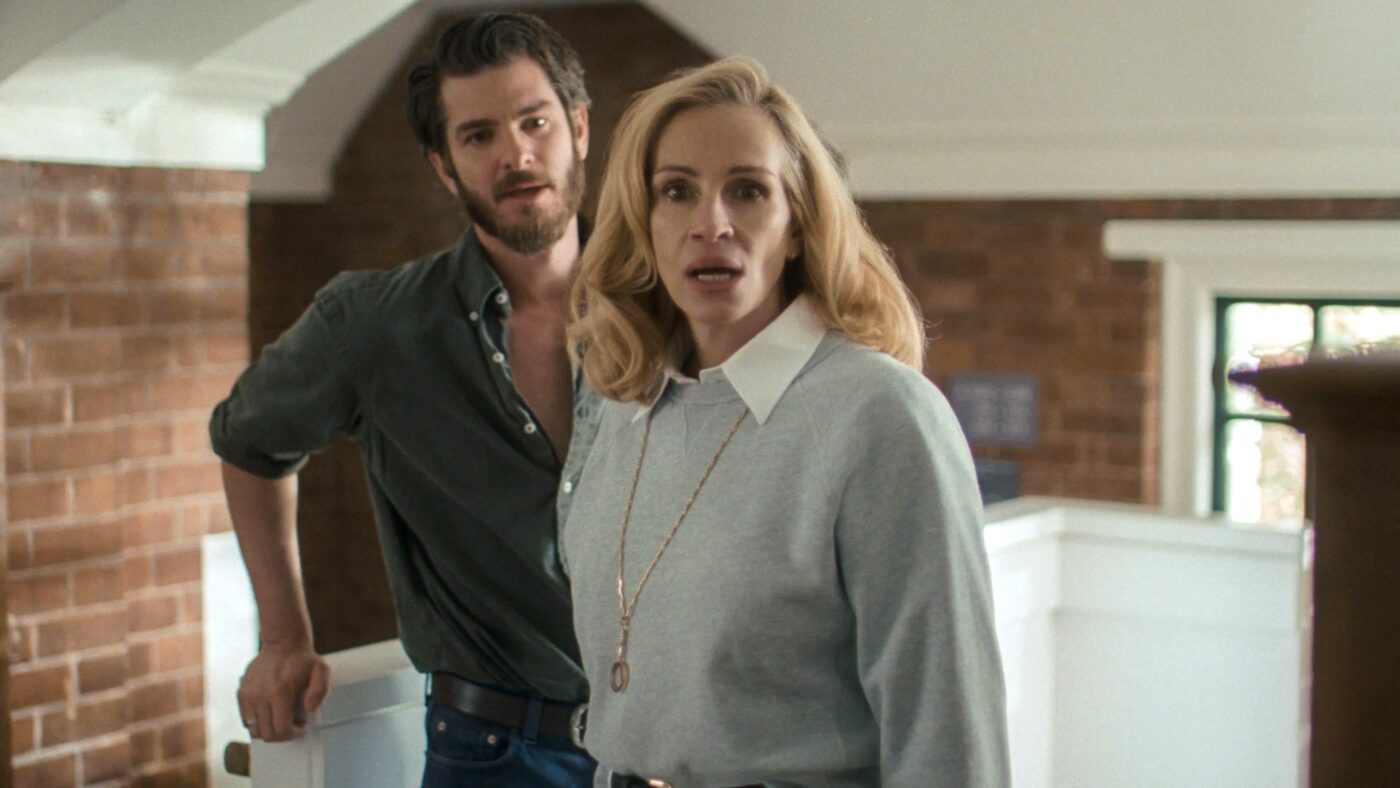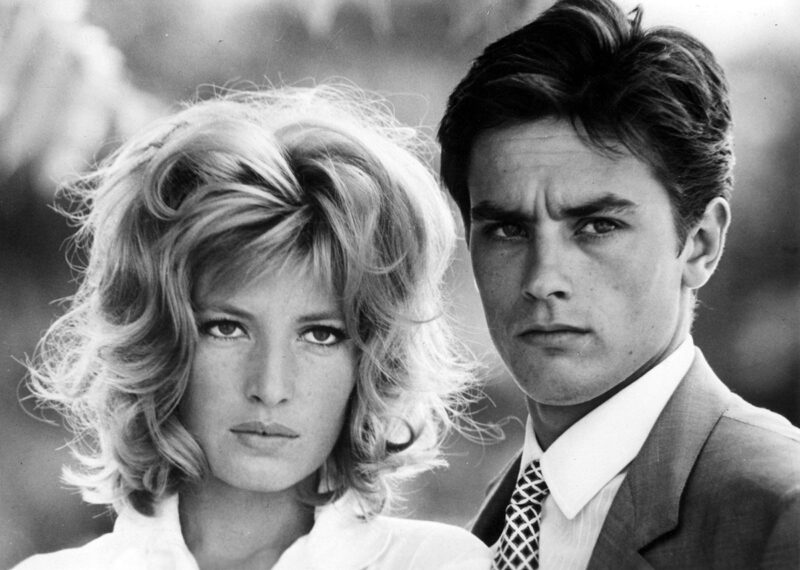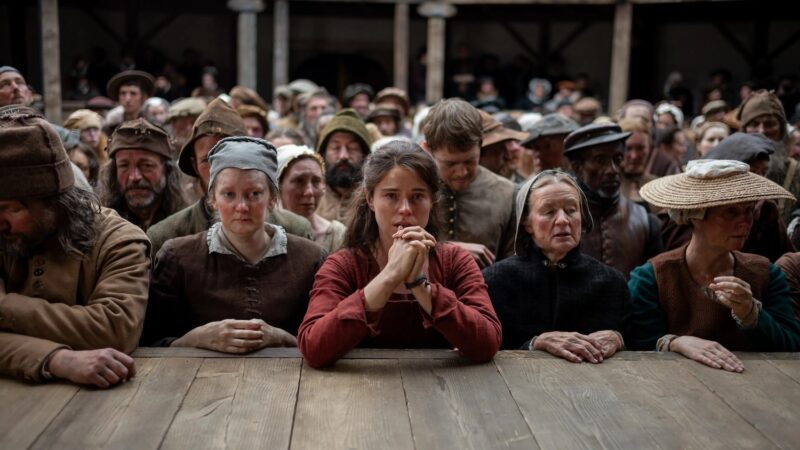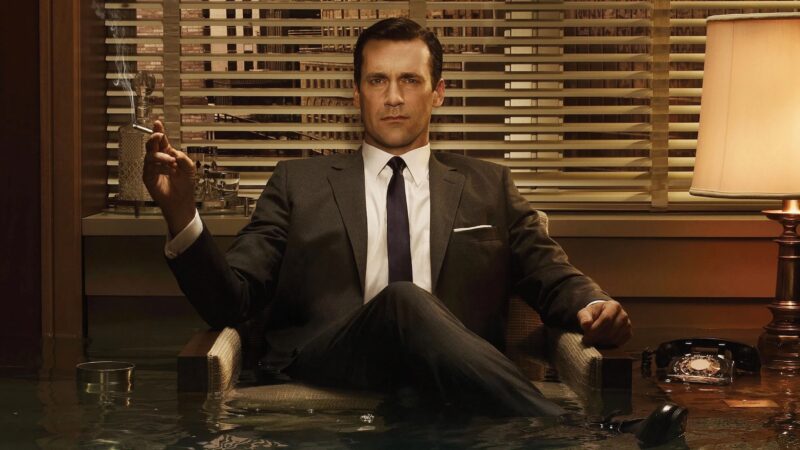In the weeks since Luca Guadagnino’s After the Hunt premiered at the Venice Film Festival, a chorus of dissenting voices has attempted to define the supposed ‘message’ of the movie. Some have called it a commentary on the growing generation gap – jaded Gen X versus “woke” Gen Z — while others claim it’s a statement on the post #MeToo climate, though Guadagnino himself has resisted this definition in the press, calling it lazy. That’s because After the Hunt is more than a sociopolitical time capsule, and it’s not offering up its characters for easy judgment. The brilliance of the movie lies in its ambiguity, an admittedly difficult (but desperately important) feeling for viewers to sit with.
The first scene is set by a title card announcing, “It happened at Yale.” (Filming actually took place in England, but the meticulously recreated Ivy League campus fooled this Connecticut native.) Philosophy professor Alma Imhoff (Julia Roberts) and her psychoanalyst husband Frederik (Michael Stuhlbarg), are hosting a party at their cavernous, stylishly-appointed apartment, where the sort of biting, intellectual banter one might expect from a gathering of academics evolves into a mostly lighthearted debate about cancel culture between Ph.D. student Maggie Resnick (Ayo Edebiri) and Imhoff’s fellow professor Hank Gibson (Andrew Garfield). Hank criticizes the younger generation for their fear of saying anything that might be deemed offensive; Maggie chafes at the “sweeping generalization.”
Alma presides with a bemused detachment. As Maggie’s mentor, she shows a fondness for the apparently gifted scholar (whose wealthy parents are significant donors to the university), but she’s even more obviously enamored of Hank. Draped over each other on the couch, their familiarity borders on the possessive…and, considering Frederik is seated just a few feet away, even inappropriate. It’s not surprising when Frederik pointedly brings up the question of what might happen to Alma and Hank’s friendship should only one of them get tenure. Even if their touchy-feely dynamic were perfectly innocent, Hank’s proprietary physicality with Alma in the presence of her husband seems like something of a red flag. Maggie, too, makes us question her intentions when she accidentally discovers a secret envelope carefully hidden in Alma’s bathroom cabinet and pockets a newspaper clipping stashed inside.
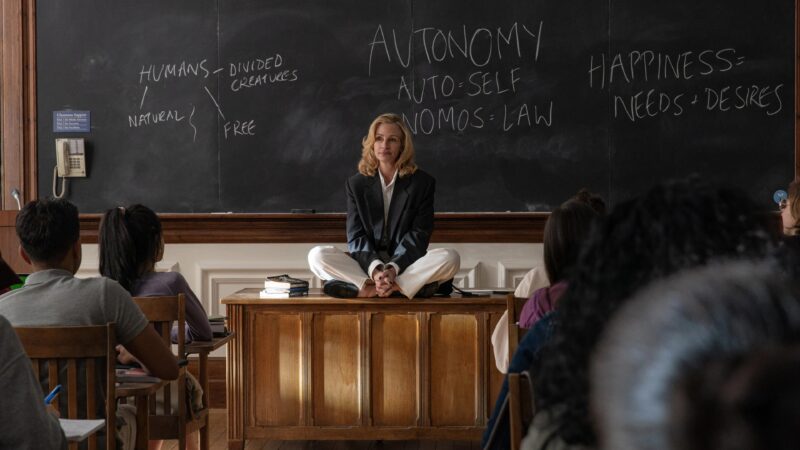
‘After the Hunt’ • Photo: Yannis Drakoulid/Amazon MGM Studios.
So when Hank and Maggie, a lesbian, stumble out the door together at the end of the party, the trajectory of the rest of their evening already seems fraught. Sure enough, Maggie shows up on Alma’s doorstep the next night, squatting and shivering, and tells her that Hank assaulted her after inviting himself over to her apartment for a nightcap: “He crossed the line.”
Alma presses Maggie for details, but she won’t elaborate. Instead, she recoils at her professor’s skepticism. Not long after, Hank offers his own version of the story over a plate of tandoori chicken at his favorite Indian restaurant, telling Alma that he caught Maggie cheating on her dissertation and confronted her. According to Hank, Maggie came up with the assault story to cover up his plagiarism accusation. Whether or not Alma believes him, she is disappointed. Her demeanor grows cool and detached, as Hank’s temperature rises with burning indignation. He’s even more agitated when he shows up at Alma’s classroom days later to announce that he’s been fired over Maggie’s accusations. After pulling Alma into the hallway to yell at her for not defending him to the dean, he throws a spectacular tantrum, pulling flyers from the wall as he storms out of the building. In the aftermath, Alma comforts Maggie, seemingly taking her side…but their alliance is short-lived.
Alma invites Maggie to dinner at her apartment, where she cautions her against talking to the press (Stuhlbarg truly shines in this scene, storming in and out of the kitchen in dramatic frustration over his wife’s entanglement in the situation), but Maggie ends up doing it anyway. This leads to a tense face-off in a parking lot where Maggie finally brings up the envelope she found in Alma’s bathroom and the secret it contained: As a teenager, Alma accused her father’s friend of assaulting her (but later recanted). Maggie asks if Alma’s history is the reason why she wasn’t initially as supportive as she might have been, but Alma rejects Maggie’s bonding attempt, furious over the invasion of privacy. The next time they meet, in an explosive confrontation on campus, Alma echoes Hank’s plagiarism accusations in a devastatingly precise attack on Maggie’s character. The final blow comes when Alma tells Maggie that nobody believes her claims about Hank. Maggie, seemingly unable to process being spoken to in such a manner, slaps her in retaliation.
Adding to Alma’s literal discomfort is her chronic stomach pain (the movie is punctuated by shots of Alma’s feet under bathroom stall doors and her elegant, bespoke-suited frame hunched over toilets). So severe is her affliction that her dreams of tenure are dashed when she’s caught forging a prescription for pain medication by her colleague, school psychiatric counselor Dr. Kim Sayers (a delightfully sardonic Chloe Sevigny).
Roberts is heartbreakingly fragile in the scenes documenting her physical decline, but it’s her measured portrayal of Alma’s mental unraveling that makes this performance one of her most remarkable. By the time she finds Hank holed up in her spare apartment by the wharf, she’s in desperate need of tangible comfort; even though she’s still angry, she’s perhaps more open to hearing what he has to say. Hank maintains that he didn’t rape Maggie, though he doesn’t deny flirting with his students. The only time he ever broke the rules, Hank says, was with Alma — a statement that hangs in the air for an electrified moment before they kiss (something we’ve been expecting to happen since the opening scene of the movie). But what starts out as almost sweet turns violently wrong in an instant, and Alma’s repeated refusals go ignored until she’s able to shove Hank away. As an expression of dull horror crosses her face, it’s almost as if you can hear Maggie’s words running through Alma’s head: “He crossed the line.”
While Guadagnino never outright answers the question of whether Hank is telling the truth, his behavior in this scene is damning, to say the least. It’s also unpleasantly familiar to most women. Garfield taps into the sort of bristling, chaotic sexuality that’s always simmering just underneath the surface with some men, threatening to take over at any moment. It’s a force that can be either thrilling or terrifying, and Hank is (usually) charming enough to make it work to his advantage. For Alma, however, the spell is broken.
Alma’s lowest moment comes shortly thereafter, when she returns to campus to find that Maggie criticized her and Yale for the way they handled her allegations in a Rolling Stone article. Swarmed by a mob of angry students, she falls to the ground, clutching her stomach in agony. Later, from her hospital bed, Alma at last tells Frederik the truth about what happened to her as a teenager: It was a love affair with her father’s friend, she says, not an assault; she pursued him, lived for him…and when he broke things off, she accused him of rape because she thought that would hurt him the most. (She was right. Even though she walked back on her claims, the man eventually killed himself.) Endlessly compassionate, Frederik gently reminds her that she was still a child, in love or not. It was statutory rape.
Roberts delivers this monologue with a crushing heaviness. For a lifetime, she’s tried to balance these conflicting realities in her head, rewriting her narrative to make it easier to swallow…only to gag on it later (literally, in bathrooms all over the Yale campus). She’s spent years making excuses for the men she loves, from that first, doomed lover to Hank, all while holding the one man who truly cherishes her for the person she is, faults and all, at bay. Perhaps, on some level, she’s cast herself as the villain of her own story, undeserving of real love.
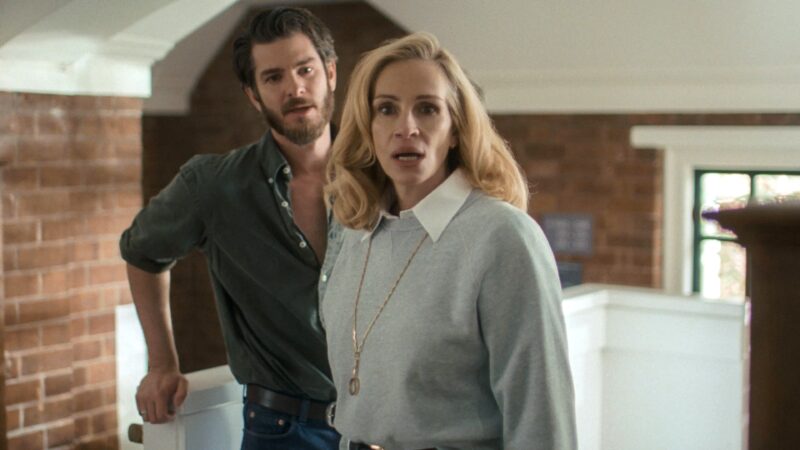
‘After the Hunt’ • Photo: Yannis Drakoulid/Amazon MGM Studios.
After the Hunt has been labeled by some critics as anti-feminist, a warning against “believing all women,” but this is an exasperatingly simplistic view of a story about deeply complicated people. The unfortunate fact is that accusers are not always likable, or even consistently reliable, but just because a human being isn’t honest all the time doesn’t mean everything they say is a lie. Not every movie can (or should) be distilled into an ideological soundbite.
A final scene takes place five years later, when Alma and Maggie reunite at the same Indian restaurant where Hank and Alma first talked about that fateful evening. It’s not a particularly warm meeting; though both women are cordial enough, they don’t seem to like each other all that much. Maggie is almost giddy as she tells Alma how much she once idolized her and how she spent a long time wishing for her to fail. Alma, for her part, seems neither surprised nor particularly bothered, though she does apologize for hurting Maggie. Her career has recovered in the years since the forged prescription and the scandal — she’s now the dean of her department — and her marriage to Frederik is still going strong. As for Hank, the conversation reveals that he’s working as a political spin doctor.
During a post-screening press conference at New York Film Festival, Guadagnino said the last scene was a “false reconciliation and maybe a needed reconciliation between these two women,” according to Forbes.
“They’ve been fighting over, imposing on one another their own truth and being hurt by the incapacity of one another to understand their own truth and their secrets, and ultimately trying to find a way to own their powers in their hands,” he continued. “After the hunt, after the dust settles, with the distance of time and with the comfortability of the blanket of snow that kind of silences everything, all the screams and all the furies, they understand what one didn’t want from the other and the other way around and what they got and what they lost, but what is always going to be at the center of their lives is capital and that’s it.”
Unlike the characters at its center, After the Hunt doesn’t impose its truth on anyone. Instead, it gives viewers the freedom to search for their own answers…and to find the truth for themselves.

